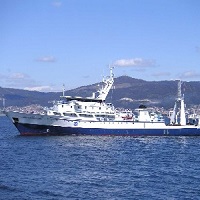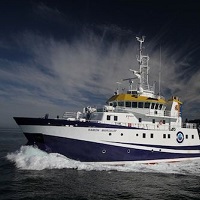Keyword
Biological detritus in the water column suspended particulate material
17 record(s)
Type of resources
Categories
Topics
INSPIRE themes
Keywords
Contact for the resource
Provided by
Years
Formats
Status
-

58 CTD stations performed from 10 to 5200 , depth along trhee transect om N-NW Iberian Peninsula
-

Oceanographyc survey collected in the framework of theSTOCA and INGRES3 projects. STOCA is a program conducting systematic hydrographic and plankton observations along three standard sections in the eastern Gulf of Cadiz. INGRES3 is a Spanish Ministry for Science and innovation funded project that maintains a mooring line at the Spartel sill in the Strait of Gibraltar.
-

The objective of the DOS MARES project is twofold. First, we aim at understanding the effects of the atmospheric teleconnections between the Cantabrian Sea and the north-western Mediterranean Sea, and their impacts on the deep ecosystem, both pelagic and benthic. Second, we want to know in which way the transfer of the signal from the external forcings towards the deep ecosystem controls the community structure and the population dynamics. Thus, in March 2012 we deployed 6 mooring lines equipped with sediment traps and currentmeters in the Avilés and Gaviera canyons and the slope. In September 2012 the moorings were successfully recovered and redeployed again, and during this cruise DOSMARES BIOCANT3 they have been finally recovered and the 1-year monitoring effort finalised. In addition, CTD profiling has been performed to characterise the biological and physical structure of the water column (including the acquisition of discrete water samples), multicorers have been obtained to characterise the geochemical properties of surface sediments, and a multinet used to obtain macro- and meso-zooplankton community structure. Overall, data will allow to characterize the external forcings and abiotic conditions in the Cantabrian Sea, and thus establish the links between abiotic conditions, populations and pelagic and benthopelagic resources.
-

The objective of the DOS MARES project is twofold. First, we aim at understanding the effects of the atmospheric teleconnections between the Cantabrian Sea and the north-western Mediterranean Sea, and their impacts on the deep ecosystem, both pelagic and benthic. Second, we want to know in which way the transfer of the signal from the external forcings towards the deep ecosystem controls the community structure and the population dynamics. Thus, in March 2012 we deployed 6 mooring lines equipped with sediment traps and currentmeters in the Avilés and Gaviera canyons and the slope. In September 2012 the moorings were successfully recovered and redeployed again, and during this cruise DOSMARES BIOCANT3 they have been finally recovered and the 1-year monitoring effort finalised. In addition, CTD profiling has been performed to characterise the biological and physical structure of the water column (including the acquisition of discrete water samples), multicorers have been obtained to characterise the geochemical properties of surface sediments, and a multinet used to obtain macro- and meso-zooplankton community structure. Overall, data will allow to characterize the external forcings and abiotic conditions in the Cantabrian Sea, and thus establish the links between abiotic conditions, populations and pelagic and benthopelagic resources.
-

Multidisciplinary campaing for mooring instruments and adquiring samples and variables to: * Know the thermohaline, kinematic, dynamic and biological characteristics of the Gulf of Cadiz. * Study of carbon fluxes between the Atlantic and Mediterranean. * Linking climatology, hydrology and hydrodynamics and the early stages of development of the species associated with the platform, with a focus on species of fishing interest. * Provide data to feed global and regional numerical models. * Generate and distribute a database to know the evolution of marine climate and its resources.
-

Multidisciplinary campaing for mooring instruments and adquiring samples and variables to: * Know the thermohaline, kinematic, dynamic and biological characteristics of the Gulf of Cadiz. * Study of carbon fluxes between the Atlantic and Mediterranean. * Linking climatology, hydrology and hydrodynamics and the early stages of development of the species associated with the platform, with a focus on species of fishing interest. * Provide data to feed global and regional numerical models. * Generate and distribute a database to know the evolution of marine climate and its resources.
-

Multidisciplinary campaing for mooring instruments and adquiring samples and variables to: * Know the thermohaline, kinematic, dynamic and biological characteristics of the Gulf of Cadiz. * Study of carbon fluxes between the Atlantic and Mediterranean. * Linking climatology, hydrology and hydrodynamics and the early stages of development of the species associated with the platform, with a focus on species of fishing interest. * Provide data to feed global and regional numerical models. * Generate and distribute a database to know the evolution of marine climate and its resources.
-

Multidisciplinary campaing for mooring instruments and adquiring samples and variables to: * Know the thermohaline, kinematic, dynamic and biological characteristics of the Gulf of Cadiz. * Study of carbon fluxes between the Atlantic and Mediterranean. * Linking climatology, hydrology and hydrodynamics and the early stages of development of the species associated with the platform, with a focus on species of fishing interest. * Provide data to feed global and regional numerical models. * Generate and distribute a database to know the evolution of marine climate and its resources.
-

Multidisciplinary campaing for mooring instruments and adquiring samples and variables to: * Know the thermohaline, kinematic, dynamic and biological characteristics of the Gulf of Cadiz. * Study of carbon fluxes between the Atlantic and Mediterranean. * Linking climatology, hydrology and hydrodynamics and the early stages of development of the species associated with the platform, with a focus on species of fishing interest. * Provide data to feed global and regional numerical models. * Generate and distribute a database to know the evolution of marine climate and its resources.
-

Multidisciplinary campaing for mooring instruments and adquiring samples and variables to: * Know the thermohaline, kinematic, dynamic and biological characteristics of the Gulf of Cadiz. * Study of carbon fluxes between the Atlantic and Mediterranean. * Linking climatology, hydrology and hydrodynamics and the early stages of development of the species associated with the platform, with a focus on species of fishing interest. * Provide data to feed global and regional numerical models. * Generate and distribute a database to know the evolution of marine climate and its resources.
 Catálogo de datos del IEO
Catálogo de datos del IEO